Content
- 1 What is routine
- 2 What does the body need rutin for?
- 3 The benefits and harms of a routine
- 4 Rutin thickens or thinns the blood
- 5 Daily rate routine
- 6 What foods contain rutin
- 7 Vitamins with Routine
- 8 Indications for the use of rutin
- 9 Symptoms of a lack of routine
- 10 How to take rutin
- 11 Contraindications and side effects of routine
- 12 Conclusion
- 13 Routine reviews
Rutin is a vitamin P essential for the healthy functioning of many body systems. Sometimes it is impossible to get it from food in the required amounts, it makes sense to take vitamin in the form of additional supplements.
What is routine
The substance rutin, which is also called rutoside, is better known as vitamin R. Rutin belongs to the category of antioxidants and flavonoids, it dissolves well in water, is destroyed by heating, freezing and exposure to sunlight.
For human health, rutoside has an increased value. But you can get it only from special additives or from food, it is not produced by the cells of the body on its own.
What does the body need rutin for?
The effect of routine on the human body can hardly be overestimated. It participates in redox processes at the cellular level, is responsible for oxygen saturation, and normalizes the state of connective tissues.
Rutin in the body is responsible for the normal functioning of the metabolic system and for the strength of blood vessels, prevents premature aging and protects against the development of allergic reactions. Rutoside is needed for the healthy functioning of the immune system and the circulatory system, the substance maintains the heart and digestion in good condition, prevents weakening of hair and deterioration of the skin.
The benefits and harms of a routine
The properties of rutin found in food and vitamin complexes can be beneficial and harmful to the body. It all depends on the dosage of the substance - a normal level of rutoside affects only positively the state of health, while an excess can be harmful.
Subject to the correct dosages of routines:
- supports the functioning of the immune system and prevents the development of colds and viral diseases;
- improves the functioning of the metabolic system, promotes the production of vitamin E in the body and the good absorption of vitamin C;
- helps reduce allergy symptoms by inhibiting the production of serotonin and histamine;
- strengthens blood vessels and prevents their fragility, lowers the level of harmful cholesterol and prevents the development of varicose veins and thrombosis;
- improves blood composition and normalizes cardiac activity;
- regulates the work of the adrenal cortex and gallbladder;
- increases the body's resistance to toxins and free radicals, therefore it is considered important for the prevention of cancer;
- lowers the acidity of the stomach and is of great benefit for gastritis with increased production of gastric juice and ulcers;
- helps to lower blood pressure;
- has an analgesic effect and helps to relieve puffiness;
- prevents premature aging and keeps skin and hair youthful.

Unlike many other vitamin compounds, rutin is rapidly excreted from the body and does not accumulate in tissues. Therefore, even with an overabundance of harm, it almost does not bring. Nevertheless, against the background of an increased level of rutoside, the appearance of such adverse reactions as:
- nausea;
- heartburn and headache;
- loose stools;
- slight increase in temperature.
Rutin thickens or thinns the blood
The effect of rutin on the blood often raises questions, since the vitamin is recommended for both varicose veins and increased bleeding. The benefit of rutin is that the substance has a double effect - with a short use, it thickens the blood, and with prolonged use, it dilutes.
Daily rate routine
When using the vitamin rutin, it is important to observe the dosages, however, they can vary depending on the situation:
- For a healthy person, the daily intake is 25 to 50 mg of the substance per day.
- During treatment, the daily dose of rutin can be increased to 200 mg per day, since the body requires large amounts of rutoside.
- With heavy physical exertion, the daily rate is recommended to be maintained at the level of 100-150 mg per day.
In any case, the daily volume of rutoside should not exceed 400 mg, otherwise side effects from an overdose of the substance may appear.
What foods contain rutin
Since rutin is not produced independently in the body, it can only be obtained from the outside. A valuable vitamin is present in many foods, first of all, the rutin content in citrus fruits is high. At the same time, the substance is present in the highest concentration between the lobules and in the zest.

Rutoside is also found in the following foods:
- in black chokeberry - up to 4000 mg per 100 g;
- in cherries and black currants - 1900 and 1500 mg, respectively;
- in dried rose hips - up to 680 mg;
- in gooseberries and lingonberries - 650 mg;
- in fresh sorrel - 500 mg;
- in grapes - 430 mg.
You can get rutin from potatoes and greens, from white cabbage and carrots; the substance is also present in capers and olives. All of these foods are recommended to be included in the regular diet at least in small amounts to maintain a normal level of routine.
Vitamins with Routine
If it is not possible to make up for the lack of rutoside with simple nutrition, or the amount of rutin in food is too small, you can resort to pharmaceutical drugs. In pharmacies, several inexpensive products are sold at once, in which rutin is present in large quantities.
Ascorutin
The preparation contains vitamins P and C. Ascorutin is used to reduce the fragility of blood vessels and capillaries, to improve blood clotting. It is necessary to take the drug with caution in case of a tendency to thrombosis, and you should also not use Ascorutin for more than 3-4 weeks in a row, this can cause diarrhea, nausea and headaches.
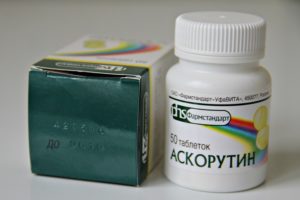
Troxerutin
The drug is available in tablets or gel. Troxerutin is used to strengthen blood vessels, relieve inflammation and against edema.
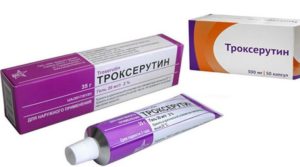
It is possible to use Troxerutin gel only if there are no open lesions on the skin, and the tablets cannot be used in case of acute gastritis or stomach ulcers. Also, it is necessary to refuse taking the drug in the first trimester of pregnancy and during lactation.
Rutascorbine
Like Ascorutin, the pharmaceutical preparation contains vitamins C and P in equal proportions. Rutascorbin is taken to relieve inflammation and edema, to strengthen the vascular walls and improve blood clotting. The course of using the drug is 3-4 weeks, after which you need to take a break.
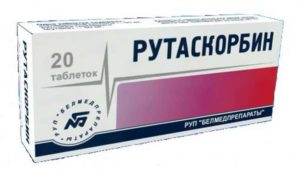
Prophylactin C
The composition of the pharmaceutical preparation includes vitamin C and rutoside.The tool is sold in the form of tablets, take Prophylactin C together with water during meals, 2-5 tablets per day. You need to use the remedy for 30 days, then it will bring a pronounced beneficial effect in strengthening blood vessels and relieving inflammation.

Indovazin
The vitamin preparation in the form of a gel contains rutoside and indomethacin, an anti-inflammatory substance. An ointment with a routine is used to relieve swelling and pain and to strengthen blood vessels, and it can be used in all cases, except for pregnancy and the presence of open lesions on the skin.
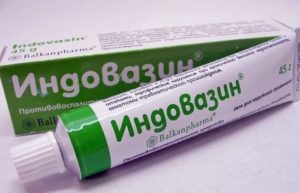
Indications for the use of rutin
Taking medications containing rutin or foods with an increased amount of this substance is recommended for many diseases. Among the main indications may be:
- various internal and external bleeding;
- hemophilia;
- hypovitaminosis P;
- hemorrhages during infectious processes - scarlet fever, measles and viruses;
- ulcers of the stomach and duodenum;
- skin diseases - eczema, dermatitis and others;
- rheumatism;
- inflammation of the walls of blood vessels of an allergic nature;
- toxic damage to capillaries;
- hemorrhoids, thrombophlebitis and varicose veins;
- lymphostasis and venous insufficiency of the legs;
- hypertension;
- septic endocarditis;
- Quincke's edema;
- glomerunephritis with hemorrhage;
- diseases of the gallbladder and biliary tract.
An additional intake of rutin is often prescribed for allergies and bronchial asthma, for hay fever and gastric disorders. It is useful to use the substance to increase immune resistance and for the prevention of oncology.
Symptoms of a lack of routine
The symptoms of a lack of rutin in the body are expressed mainly in increased fragility of blood vessels and a tendency to bleed. With a lack of vitamin P, frequent bleeding from the nose, increased bleeding of the gums and the rapid onset of bruises, even from minor bruises, are characteristic.
Also, a deficiency in routine can be expressed:
- in acne and hair loss;
- pain in the legs when walking;
- lethargy and fatigue;
- sleep disorders.
Against the background of a lack of vitamin P, malfunctioning of the kidneys and tissue edema often appear.
How to take rutin
Vitamin P should be consumed in accordance with the instructions provided with each specific preparation. General recommendations include:
- Rutin is used mainly after meals on a full stomach, while the daily dosage is divided into 2-3 doses.
- On average, 150 mg of rutin is consumed per day. In severe conditions, the daily dosage can be increased, up to 1200 mg under the supervision of a physician.
For children, the dosage of vitamin P should be reduced, to only 10 mg for infants and 15 to 40 mg for older children and adolescents.
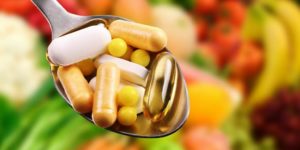
Contraindications and side effects of routine
Since rutin does not accumulate in the body and is quickly excreted from the tissues even in case of an overdose, in general the vitamin is considered quite safe. The only strict contraindications for routine are that it cannot be taken by pregnant women in the first trimester.
Side effects occur with a routine overdose and include nausea, diarrhea and headache, bloating, fever and skin rashes may also appear. If unpleasant symptoms occur, the routine should be stopped immediately. After that, the side effects will disappear on their own.
Conclusion
Rutin is the vitamin Rutoside, or vitamin P, which can only be obtained externally. Controlling your routine levels helps maintain body health and wellness.At the same time, you need to take vitamin supplements only when necessary - an excess of routine is not dangerous, but leads to the appearance of negative symptoms.

